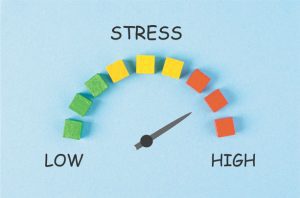Jose M. Baez, M.D., F.A.C.P., Board Certified by American Board of Internal Medicine
 Stress is your body’s normal and natural response to a perceived threat. It can be good or bad. Stress can drive you to accomplish things and it can help you to avoid danger or it can cause you to pull out your hair and make you look old before your time.
Stress is your body’s normal and natural response to a perceived threat. It can be good or bad. Stress can drive you to accomplish things and it can help you to avoid danger or it can cause you to pull out your hair and make you look old before your time.
Whether good or bad, too much stress can have a big impact on your physical and emotional health. Much research has been conducted to show the correlation between stress and problems such as heart disease or depression, for example. But what about the link between stress and cancer? The answer isn’t completely clear, but experts are studying the possible role that stress can play in the development of various types of cancer.
Types of Stress
Before we dig too deep into the connections between stress and health, let’s take a step back and discuss the different types of stress. There are basically two types of stress, acute and chronic. To some degree, both are a normal part of daily life.
Acute stress
Acute stress is what most people imagine when they talk about stress. It’s typically short-lived and triggered by specific situations.
These might include:
. Needing to slam on your brakes to avoid hitting a car that’s pulled in front of you
. Having an argument with a family member or friend
. Being in traffic that’s causing you to be late to work
. Feeling pressure to meet an important deadline
Acute stress can cause several physical symptoms, including an increased heart rate and/or blood pressure, muscle tension, quick breathing, and sweating. These effects are usually temporary and resolve themselves once the stressful situation is over.
Chronic stress
Chronic stress happens when your stress response is activated for prolonged periods of time. It can wear you down both physically and emotionally.
Examples of things that can lead to chronic stress include:
. Living in a dysfunctional or abusive home situation
. Working a job that you hate
. Having frequent financial trouble
. Living with a chronic illness or caring for a loved one who does
Compared to acute stress, chronic stress can have long-term effects on your physical and emotional health. Over time, chronic stress can contribute to conditions such as heart disease, anxiety and depression, and a weakened immune system.
What you can do
Lowering your level of stress is not only good for you in the present, but it is also beneficial to your long-term health. For example, many studies have shown that improving one’s psychological health can have a positive impact on cardiovascular health as well.
Here are some ways to reduce stress in your life:
Identify the cause of the stress.
Throughout the day, if you feel stress, make a note of it. Write down your thoughts and your mood. Once you identify what causes your stress, you can begin to deal with it. Maybe you need to adjust your expectations of yourself or ask for help at home or at work. Make a list of your priorities and eliminate the things that are not essential.
Rest your mind.
Getting 6-8 hours of sleep is of utmost importance. Your mind needs to rest just like your body does. In order to improve the quality and quantity of your sleep, try to cut back on television or other screen time before bed each night. Caffeine should also be limited in the afternoon and evening hours.
Take a walk.
Being active is not only important for physical health, but for mental health as well. When you feel stressed, try going for a brisk walk. This can help you to disconnect from a stressful situation and allow you time to process your feelings. Plus, exercise increases endorphin production which naturally boosts your mood.1
Whether you are dealing with acute or chronic stress, seeing a doctor is one step you can take toward living well. While there is no “one size fits all” cure for stress, adequate and informed treatment can improve your life now and in the long run. If you’d like to speak to a doctor, contact Dr. Jose Baez, MD. Dr. Baez is a Board-certified physician with more than 30 years’ experience. He can be contacted via email at info@JoseMBaezMD.com or by calling his office at 239.777.0663. His website (www.josembaezmd.com) includes information about concierge medicine and how it can work for you.
About Dr. Baez
José M Baez MD, FACP is a Board-certified Internal Medicine specialist with over 30 years of experience in both inpatient and outpatient settings. He is a Graduate of Mt. Sinai School of Medicine in NY. As a Ward Attending at Harlem Hospital, affiliate of Columbia University College of Physicians and Surgeons, he served the Greater NYC community. Subsequently, he established a private practice in Fairfield County, CT. He was also Assistant Clinical Professor at University of Connecticut, School of Medicine. Dr. Baez has been a stable member of the Naples community for 10 years, a member in good standing with the Collier County Medical Society and voted Naples Illustrated Top Physician 2018, 2019, 2020, 2021 and 2022.
Jose M. Baez, M.D.
11181 HEALTH PARK BLVD., SUITE 1180
NAPLES, FL 34110
(239) 777-0663
1. How stress affects your health, American Psychological Association.
American Psychological Association. Available at:
https://www.apa.org/topics/stress/health .









